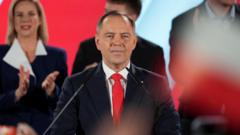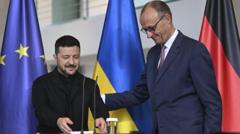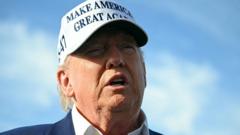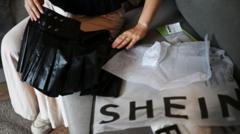Highlights of the election include the surprising rise of the Alternative for Germany (AfD) party, while long-standing parties grapple with profound losses, setting the stage for potential electoral shifts in the future.
Germany's Political Landscape Shifts Dramatically After Recent Election
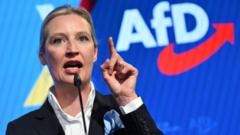
Germany's Political Landscape Shifts Dramatically After Recent Election
The German election of 2025 has revealed significant changes in the political dynamics of the country, reflecting a populace that navigates a crossroads of ideologies and party affiliations.
In the 2025 German federal elections, the political landscape has undergone a dramatic transformation. Friedrich Merz's conservative party emerged victorious, yet the rise of the Alternative for Germany (AfD) party has shifted the dynamics considerably, marking a moment of reckoning for the traditional political establishments.
The AfD has doubled its support over four years to a staggering 20.8%, emerging as the second largest force in parliament, and extending its influence from the east into the more conservative west. While the party finds itself blocked from partaking in the next government due to a "firewall" established against extremist parties, its leader Alice Weidel claims it represents a libertarian conservative movement, distancing it from racism despite the controversies surrounding its policies and ideology.
Meanwhile, the Social Democratic Party (SPD), led by outgoing Chancellor Olaf Scholz, suffered its lowest electoral performance in decades, garnering only 16.4% of the vote. The election witnessed a remarkable voter turnout of 82.5%, the highest in 40 years, demonstrating heightened public engagement during this pivotal period for Germany.
Furthermore, the three-party coalition government led by Scholz disbanded following the election, with all major party leaders announcing their departure from frontline politics. On a more positive note, the Left party regained traction, partially thanks to a vigorous social media campaign that captivated the youth demographic, which saw a notable divide in voting patterns between younger and older generations.
With the winds of change sweeping through Germany's political corridors, the repercussions of this election will undoubtedly shape the country's path forward and herald a new ideological era in German governance.
The AfD has doubled its support over four years to a staggering 20.8%, emerging as the second largest force in parliament, and extending its influence from the east into the more conservative west. While the party finds itself blocked from partaking in the next government due to a "firewall" established against extremist parties, its leader Alice Weidel claims it represents a libertarian conservative movement, distancing it from racism despite the controversies surrounding its policies and ideology.
Meanwhile, the Social Democratic Party (SPD), led by outgoing Chancellor Olaf Scholz, suffered its lowest electoral performance in decades, garnering only 16.4% of the vote. The election witnessed a remarkable voter turnout of 82.5%, the highest in 40 years, demonstrating heightened public engagement during this pivotal period for Germany.
Furthermore, the three-party coalition government led by Scholz disbanded following the election, with all major party leaders announcing their departure from frontline politics. On a more positive note, the Left party regained traction, partially thanks to a vigorous social media campaign that captivated the youth demographic, which saw a notable divide in voting patterns between younger and older generations.
With the winds of change sweeping through Germany's political corridors, the repercussions of this election will undoubtedly shape the country's path forward and herald a new ideological era in German governance.




